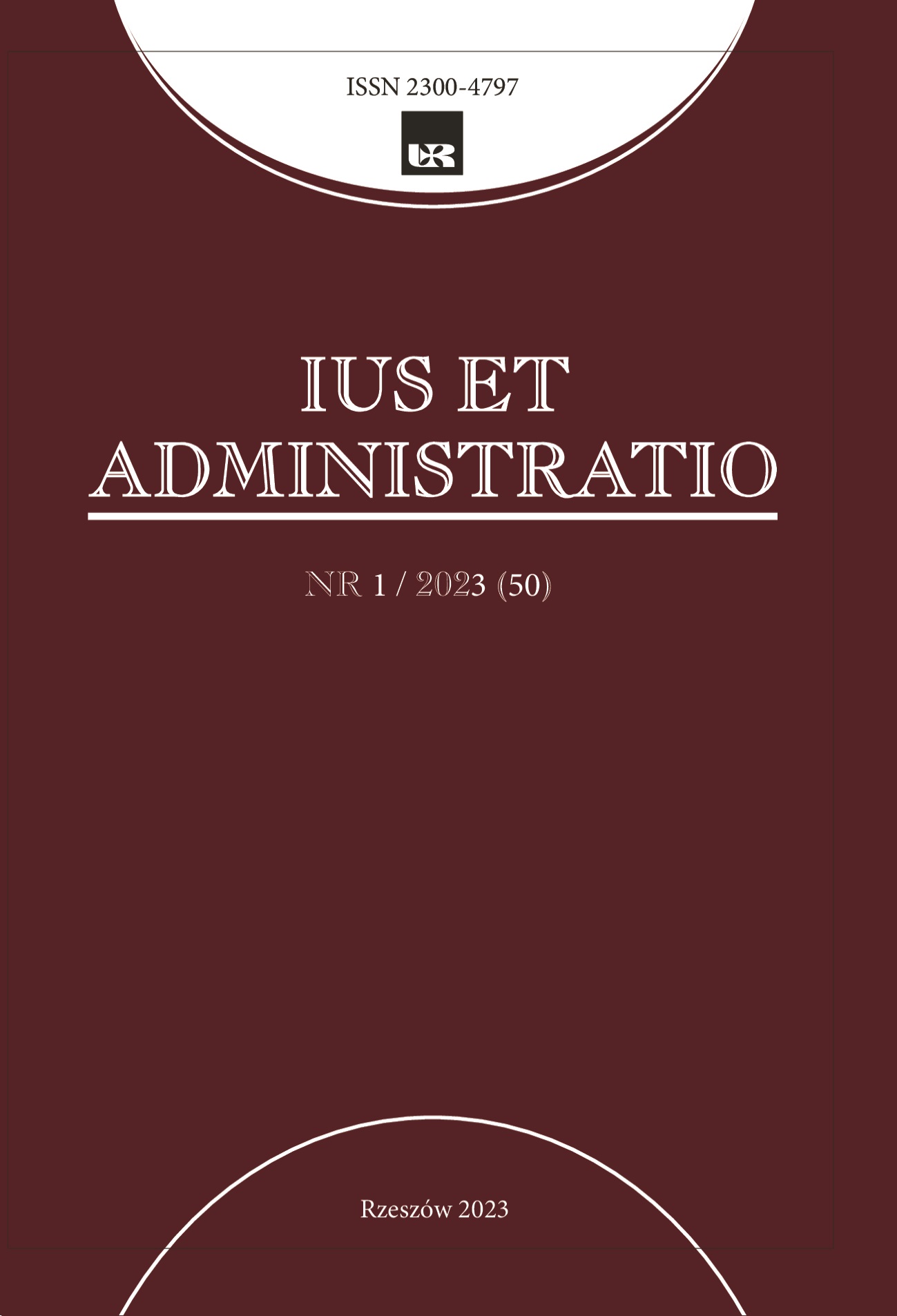Summary proceedings in Roman law using maintenance obligation as an example
DOI:
https://doi.org/10.15584/iuseta.2023.1.8Keywords:
alimony obligation, Roman law, summatim cognoscereAbstract
Maintenance obligations and corresponding maintenance claims are closely linked to the person of the obligor and the creditor. Not only is the maintenance creditor protected against the risk of being deprived of his or her means of subsistence following the introduction of his or her maintenance claim, but he or she also enjoys considerable facilities for claiming and enforcing the maintenance awarded. This was already the case in Roman law, where the assertion of a maintenance claim was subject to significant simplification, under the so-called summatim cognoscere. Proceedings for the establishment and realisation of the maintenance obligation took place without actio and iudicium, before a state judge (consul) who, after causa cognitio, issued a judgment and enforced it. Furthermore, a dispute over the fulfilment of a maintenance claim could also end with the conclusion of a settlement (transactio), ending the dispute without a judgment.
Downloads
References
Briegleb H.K., Summatim cognoscere quid et quale fuerit apud Romanos: disputatio quam pro loco in Senatu Academico rite obtinendo, Erlangae 1843.
Coretti M., Del summatim cognoscere al proceso de plano: la sumariedad en el derecho romano y en la edad media, Vergentis. Revista de Investigación de la Cátedra Internacional Conjunta Inocencio III, Vol. 1.
Dajczak W., Giaro T., Longchamps de Bérier F., Prawo rzymskie. U podstaw prawa prywatnego, Warszawa 2009.
Gołębiowska J., Przysporzenia majątkowe w stosunkach konkubenckich w ustawodawstwie Justyniana [w:] Wokół problematyki małżeństwa w prawie rzymskim. Henrico Insadowski (1888–1946) in memoriam, red. A. Dębiński, M. Wójcik, Lublin 2007.
Kosior W., Kategorie wieku w prawie rzymskim okresu królewskiego, „Zeszyty Naukowe Uniwersytetu Rzeszowskiego, Seria Prawnicza, Prawo” 2015, 17.
Kosior W.J., Kategorie i granice wieku oraz ich znaczenie w rzymskim prawie prywatnym, Rzeszów 2022.
Litewski W., Rzymski proces cywilny, Kraków 1988.
Litewski W., Słownik encyklopedyczny prawa rzymskiego, Kraków 1998.
Longchamps de Bérier F., Niektóre przykłady nadużycia prawa w rzymskim prawie prywatnym: władza ojcowska, „Czasopismo Prawno-Historyczne” 2001, 53.
Longchamps de Bérier F., Niektóre przykłady nadużycia prawa w rzymskim prawie prywatnym – władza ojcowska [w:] Przez tysiąclecia: państwo – prawo – jednostka, red. A. Lityński, M. Mikołajczyk, t. 2, Katowice 2001.
Łoś A., Wyzwoleńcy w Pompejach. Studium stosunków ekonomicznych w kampańskim mieście, Wrocław 1991.
Łoś A., Życie prywatne wyzwoleńców w Pompejach, „Acta Universitatis Wroclavianis” 1992, t. 1263.
Miklaszewski W., Wykład postępowania cywilnego rzymskiego w zarysie historycznym, Warszawa 1885.
Nowak A., Pojęcie władzy ojcowskiej w rzymskim prawie klasycznym, „Studia Prawonustrojowe” 2002, 1.
Pérez Ragone A., La ‘summatim cognoscere’ y los procesos sumarios en la doctrina germana del derecho común: hipótesis de sus horígenes entre el proceso romano y el Medievo, Estudios jurídicos en homenaje al profesor Alejandro Guzmán Brito, 2014, Vol. 3.
Simon D., Summatim cognoscere Zwölf Exegesen, Zeitschrift der Savigny-Stiftung für Rechtsgeschichte: Romanistische Abteilung Vol. 83, Issue 1.
Sondel J., Słownik łacińsko polski dla prawników i historyków, Kraków 1997.
Świrgoń-Skok R., Kategorie wieku w prawie rzymskim, „Zeszyty Naukowe Uniwersytetu Rzeszowskiego, Seria Prawnicza, Prawo” 2013, 12.
Świrgoń-Skok R., Kilka uwag na temat alimentacji w prawie rzymskim [w:] Prawo alimentacyjne. Zagadnienia systemowe i proceduralne (I), red. J.M. Łukasiewicz, I. Ramus, Toruń 2015.
Świrgoń-Skok R., Arkuszewska A., Wybrane zagadnienia dotyczące ułatwiania i przyspieszania realizacji obowiązku alimentacyjnego w prawie rzymskim oraz we współczesnym prawie polskim, „Studia Prawnicze. Rozprawy i Materiały” 2017, nr 2.
Wiliński A., Maior trimo. Granica wieku trzech lat w prawie rzymskim, „Czasopismo Prawno-Historyczne” 1955, t. 7, z. 1.
Wójcik M., Fundacje dobroczynne w rzymskim prawie poklasycznym, Lublin 2003.
Wójcik M., Pojęcie i typy fundacji w prawie rzymskim, „Roczniki Nauk Prawnych” 2000, t. 10, z. 1.
Wycisk F., Rodzicielski obowiązek wychowania potomstwa w prawie rzymskim okresu republikańskiego, „Roczniki Teologiczno-Kanoniczne” 1965, 12.
Wycisk F., Obowiązek alimentacyjny i wychowawczy w prawie rzymskim okresu królewskiego, „Roczniki Teologiczno-Kanoniczne” 1963, 10.
Wycisk F., Pojęcie alimentów w rzymskim prawie klasycznym, Warszawa 1968.
Wycisk F., Z zagadnień alimentacji w rzymskim prawie klasycznym, „Roczniki Teologiczno-Kanoniczne” 1970, 17.
Zabłocka M., Polityka dynastii julijsko-klaudyjskiej wobec wyzwoleń i wyzwoleńców, „Prawo Kanoniczne” 1984, t. 27, nr 1–2.
Zabłocki J., Kompetencje pater familias i zgromadzeń ludowych w sprawach rodziny w świetle Noctes Atticae” Aulusa Gelliusa, Warszawa 1990.
Zabłocki J., Rodzina rzymska w świetle “Noctes Atticae” Aulusa Gelliusa [w:] Rodzina w społeczeństwach antycznych i wczesnym chrześcijaństwie. Literatura, prawo, epigrafika, sztuka, red. J. Jundziłł, Bydgoszcz 1995.
Zabłocki J., The Imane of a Roman Family in „Noctes Atticae” by Aulus Gellius, Pomoerium 1996, t. 2.
Downloads
Published
How to Cite
Issue
Section
License
Copyright (c) 2023 Ius et Administratio

This work is licensed under a Creative Commons Attribution-NonCommercial-NoDerivatives 4.0 International License.

